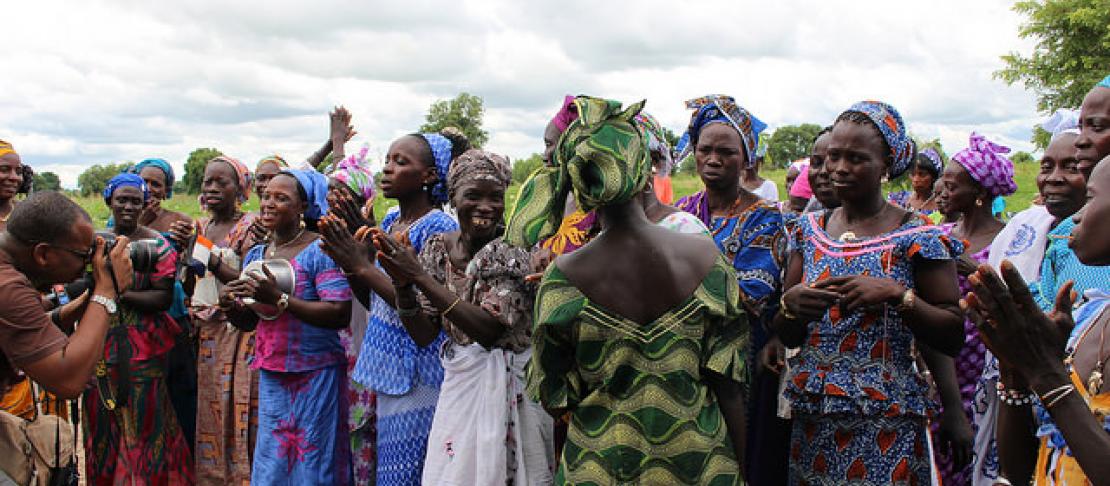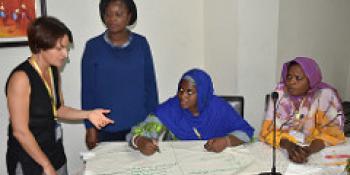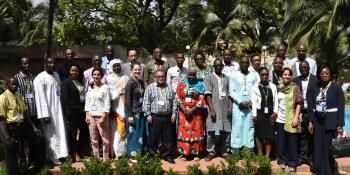Building momentum for climate-smart agriculture in West Africa

The climate-smart agriculture buzz is going around Africa, and many donors and decision-makers are looking for ways to turn the concept into action on the ground.
Andreea Nowak, Environmental Policy Specialist at the International Center for Tropical Agriculture (CIAT), recently visited Ghana, Niger and Senegal to meet with representatives of national and international institutions and build teams that will be critical to scaling out climate-smart agriculture (CSA) initiatives in West Africa.
Partnering for impact
Building a strong network of diverse CSA stakeholders from local actors to international agencies in order to increase the uptake of climate-smart agriculture in the developing world is a top priority for CCAFS’s ‘Partnerships for Scaling Climate-Smart Agriculture (P4S)’ flagship project and CIAT’s USAID funded project on ‘CSA Strategic Support for Feed the Future Stakeholders and National Institutions’ that aligns with P4S. The projects aim to open discussion about CSA with decision-makers and donors, and build on the increasing global demand for strategies to address CSA.
Nowak’s trip to West Africa included meeting with USAID regional and country missions, Ministries of Agriculture and Environment, scientific research institutes, donors and development partners including the World Bank, the High Commission of Canada in Ghana, the World Food Program, and civil society members such as CARE International. Key projects, policies, and programs linked with building climate resilience were explored along with opportunities for financing the out-scaling of CSA in the region. Further discussions with these organizations and individuals clarified how P4S and CIAT research can best complement existing efforts.
Profiling and prioritizing CSA
Specific CSA decision-support products will be utilized to evaluate pathways to achieving the CSA goals of increased food security, resilience, and low-carbon development with partners. CSA Country Profiles are being established to identify baselines of ongoing CSA action and enabling environments in six countries throughout Africa. Profiles include assessments of vulnerabilities to climate change, CSA practices of high interest, institutional and policy opportunities, and funding avenues. These will be followed in Ghana and Ethiopia with in-depth analyses, through use of the Climate-Smart Agriculture Prioritization Framework, to determine where investment can have the greatest impact and provide best value for money.
The prioritization relies on a highly inclusive process where organizations and individuals provide insights on the effectiveness of CSA options for each country. Many of the study countries are also highly diverse regarding cultural, political and economic contexts, requiring any CSA planning to be appropriately tailored to these needs and iterative to take on new future challenges.
P4S initiatives aim to build space for co-learning around existing and promising responses to address agriculture and climate change challenges. The model for developing P4S and the USAID project has been positively received by stakeholders, indicating its ability to link evidence with makers in accessible and actionable ways.
Integrating CSA into policy and programs
There is a great opportunity to better integrate CSA into existing regional and national frameworks that aim to achieve the CSA goals. The launch of the West Africa Alliance for CSA this past June demonstrates one example where action is being coordinated regionally to mainstream CSA through National Agricultural Investment Plans (NAIPs), National Adaptation Plans (NAPs), and other regional and national policies and plans.
In Senegal, the government is currently developing its NAP, integrating lessons for building adaptation strategies and prioritizing agricultural practices that address economic development in the face of climate change. In Ghana, actors are also interested in assistance on policy design, specifically on how national legislation can integrate baseline assessments on resilience building.
In Niger, Nowak participated in a high-level panel organized by the World Bank and the High Commission on the 3N initiative (Nigeriens Nourish Nigeriens), where pathways were explored for addressing agricultural risks and achieving food security in the Niger. Nowak presented CIAT’s research in the region and the P4S approach of promoting evidence based decision-making around CSA (see slideshow below):
These initiatives were seen as complementary to other efforts to build climate resilience in the country, such as the World Bank’s $111 million investment in CSA related projects.
With ongoing collaboration between CIAT, CCAFS, USAID missions and in-country actors, the aim will be to complement and invigorate existing efforts on CSA in the region. This will be done by providing the information needed to make sound investment decisions and roll out implementation on-the-ground to achieve impact at the scale needed to transform agriculture systems in face of climate-change.
Learn more
Download publication: Climate-smart tools for Africa
Models, Tools and Data: Climate-Smart Agriculture Prioritization Framework
This blog post was written by Meghan Stuthridge (Intern at CIAT in Colombia) and Andreea Nowak (Environmental Policy Specialist at CIAT).
The post was edited by Caitlin Corner-Dolloff (Climate Change Adaptation Specialist at CIAT) and Evan Girvetz (Senior Scientist at CIAT, Nairobi).



